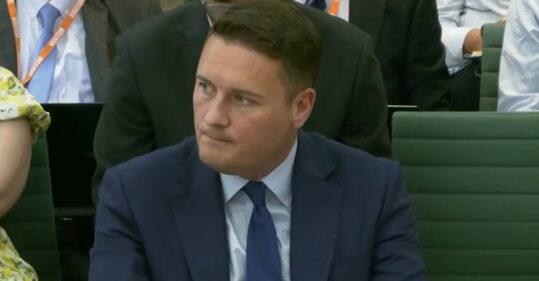Health secretary ‘not comfortable’ with how hospices are funded

The health and social care secretary says he has ‘never been comfortable’ with how funding for hospices is reliant on public donations and that the government should ‘leverage more support’ for the sector.
Speaking to the Health and Social Care Committee last week, Wes Streeting said he disagreed with how much hospices are reliant on donations, given their ‘integral’ role within the healthcare system.
‘I’ve never been comfortable with the extent to which hospices are reliant on the generosity of the public through donations to fund something that, I think, in today’s day and age is an integral part of the health and social care system,’ Mr Streeting said.
The health secretary suggested he could not commit to as much state funding for hospices ‘as I would like’ but added that the government would ‘do everything we can’ given the financial pressures currently facing the sector.
‘I think it’s worth us looking at what we can do with the sector to see if we can leverage in more support through things like match funding and other schemes to try and get more investment into the sector,’ he explained.
The latest funding boost
On Sunday, the government released a £75m funding package to hospices, to help deliver upgrades across hospices in England, including specially adapted beds, rooms and other technology.
Related Article: Not enough specialist nurses to provide palliative care in rural communities
The funding will be shared across ‘more than 170’ hospices in England, it said.
Of the £100m committed to hospice capital funding by the government, £25m was given earlier this year and had to be spent on ‘facility upgrades and refurbishments’ by the end of March 2025.
The government has previously said that the remaining £75m will be used to fund ‘more substantial’ capital projects, including ‘major building works and facility modernisation’.
Minister for care Stephen Kinnock said those in hospices ‘deserve to receive the best care in the best possible environment’.
‘I have seen first-hand how our funding is already making a real difference to improving facilities for patients and families. This additional funding will deliver further upgrades, relieving pressure on day-to-day spending,’ he added.
‘End-of-life care is crucial to our 10 Year Health Plan and our fundamental shift of moving more care out of hospital and into the community. We will continue to support hospices so they can deliver their vital work.’
Earlier this year, Nursing in Practice heard from hospice leaders who said longer-term funding was also needed to secure the future of the hospice-nurse workforce amid rising staffing costs.
The neighbourhood health service
Responding to the health secretary’s comments to the committee, Nick Caroll, chief executive of Together for Short Lives, told Nursing in Practice that almost all children’s hospices in England expect their costs to exceed their income in 2025/26.
‘As the number of seriously ill children grows and children’s hospices deliver more care and support than ever before, their costs have soared, forcing hospices to rely on public generosity to maintain essential services. Almost all children’s hospices in England expect their costs to exceed their income in 2025/26,’ he said.
Related Article: Welsh hospices given funding to deliver ‘fair salary’ for staff
‘If the UK Government does not maintain ringfenced NHS funding for children’s hospices in England beyond the end of this financial year, vital services will be cut.’
Mr Caroll urged the government to avoid a ‘sticking plaster’ approach and said children’s hospices will be ‘essential’ to the government’s ‘long-term vision’ for its recently launched neighbourhood health service.
The move towards a neighbourhood health service is central to the government’s new 10-year plan, with neighbourhood health centres to be staffed by nurses, health visitors, palliative care staff, doctors and other healthcare professionals.
James Sanderson, chief executive of the palliative care charity Sue Ryder, said the pressure on public spending and growing ageing populations requires hospices to consider ‘new models of care’.
‘That’s why we have proposed a new ecosystem for palliative care, expanding the focus from hospice buildings alone, to deliver more care in the community and within hospitals. This would ensure that people get the right care, in the right place, at the right time,’ he explained.
Funding for hospices in Scotland
Last week, the Scottish Labour party pledged to increase funding for Scotland’s hospice sector to bring about ‘fair pay’ for staff and improved support for dying patients, if they were to come to power.
Colin Poolman, executive director of Royal College of Nursing Scotland, said that funding for hospices must reflect the ‘crucial role’ of the sector in caring for people at the end of their life.
Related Article: Change needed to drive social care recruitment and retention, says minister
‘The nursing staff employed in the sector provide vital support to patients and their families at the end of life. Their safety critical role must be valued through pay that reflects their clinical skills and expertise,’ he said.
‘This should be the case nursing staff wherever they work – for those working in hospices, GP practices, care homes and the third sector, as well as in the NHS.’
Hospice and palliative care are devolved matters, meaning that each nation of the UK is responsible for its own policies, funding arrangements, and commissioning of hospice services.

See how our symptom tool can help you make better sense of patient presentations
Click here to search a symptom


![Menopause: identification and management [NG23]](https://s3-eu-west-2.amazonaws.com/images.nursinginpractice.com/wp-media-folder-nursing-in-practice/wp-content/uploads/2025/03/PULSE-NIP-UPLOAD-BAYER-NICE-MENOPAUSE-A5-HANDBOOK.jpg)
